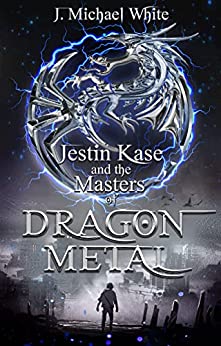 INDIANAPOLIS, Ind. – In his fiction debut, award-winning journalist J. Michael White draws on his experience as a reporter to develop the world of his new urban fantasy novel, “Jestin Kase and the Masters of Dragon Metal” (May 3, 2022, Teer Publishing).
INDIANAPOLIS, Ind. – In his fiction debut, award-winning journalist J. Michael White draws on his experience as a reporter to develop the world of his new urban fantasy novel, “Jestin Kase and the Masters of Dragon Metal” (May 3, 2022, Teer Publishing).
Mankind lost the battle for its soul without knowing. Evil won. And no Chosen Ones are coming to the rescue.
Enter Jestin Kase, a foster kid on the run in Chicago. He finds himself drawn into the underbelly of civilization, where the Three Great Schools of Magic are crippled by their own corruption and unable to push back against the Great Dark. Monsters from Babylonian myth, demons, and the enthralled thrive beneath the notice of everyone. Only one force of good remains: an ancient magic called Dragon Metal. And Jestin is determined to learn its secrets.
But how much of a difference can one person make in a world that’s already fallen?
There’s no fate.
No destiny.
Only Metal. And those brave enough to wield it.
“Jestin Kase and the Masters of Dragon Metal”
J. Michael White | May 3, 2022 | Teer Publishing | Urban Fantasy / Young Adult
Print | ISBN 979-8-9852213-0-5 | Price $14.99
E-Book | ISBN 979-8-9852213-1-2 | Price $4.99
 J. MICHAEL WHITE: J. Michael White is an award-winning journalist and author of young adult urban fantasy action-adventure stories. His career as a newspaper reporter gave him deep glimpses into the challenges of the world, from the struggles of foster care to the tragedies of murder and war. His fiction often reflects these experiences. Instead of setting his stories in alternate, dystopian futures, he looks at the dystopia of the world we live in today, through the lens of urban fantasy and adventure, with a little dark humor. Like all responsible adults, he spends his time playing video games, reading books, and watching cartoons.
J. MICHAEL WHITE: J. Michael White is an award-winning journalist and author of young adult urban fantasy action-adventure stories. His career as a newspaper reporter gave him deep glimpses into the challenges of the world, from the struggles of foster care to the tragedies of murder and war. His fiction often reflects these experiences. Instead of setting his stories in alternate, dystopian futures, he looks at the dystopia of the world we live in today, through the lens of urban fantasy and adventure, with a little dark humor. Like all responsible adults, he spends his time playing video games, reading books, and watching cartoons.
Follow J. Michael White on social media:
Twitter: @JMichael_White | Instagram: @thejmichaelwhite | TikTok: @the_jmichaelwhite
In an interview, J. Michael White can discuss:
- His background as a journalist and the process of pivoting to fiction writing
- His choice to highlight the dystopia of the world we live in today instead of creating a traditional dystopian future.
- His choice to make his main character a foster child as an entry point into a larger conversation about the foster care system
- The spiritual and religious undertones of his book and why he chose to incorporate that in his writing
- His main character Jestin Kase being a part of the LGBTQ community and why the way he is portrayed is important
An Interview with J. Michael White
How did you develop the character of Jestin? Why did you give him the background of a foster kid?
I wanted a humorous, sarcastic, likeable teenager to balance the bleak background of the story. I also wanted to use Jestin as a vehicle to highlight the problems with the foster care system (my original idea for Jestin was “Oliver Twist but with demons”). Further, as a member of the LGBT community myself, I wanted the same for Jestin, but without making the story about his sexuality, something I don’t see often with LGBT representation.
Why did you set the book in Chicago?
I grew up in northwest Indiana, which is more a part of Chicago than the Hoosier state, and I’ve always loved the character of the city. It was important for me to set the story in a Midwestern city, because I wanted the story to take place in the heartland, the heart of the country.
How did you develop the idea of the Three Great Schools of Magic?
The Three Great Schools of Magic represent the state of spirituality in our world today. There are people who pervert and twist religion for greed and selfish purposes, to spread hate and to amass power. This is what the Three Great Schools represent.
You have a background in journalism — where your job is to report on reality. Was it difficult to shift your writing focus to fiction / urban fantasy? How did you go about this?
I’ve written fiction stories for my own enjoyment since I was in grade school, so the shift from journalism to fiction was pretty simple. If anything, my newspaper writing skills helped craft my fiction writing style. Also, I’ve seen some crazy things in this real world of ours, and that’s helped me build my fictional characters’ backgrounds.
This is your first novel — what inspired you to write it now?
I’ve wanted to write a book for years; I actually left the newspaper business to free up my creativity to focus on fiction. But I still never found the time to write–until the pandemic. Like many people, I’ve been working from home since COVID, and without a morning or evening commute, I have up to a couple hours of extra free time a day that I use for writing.
You make a distinction between traditional dystopian futures and the worlds you create in your writing. Can you explain what this is and why you chose this approach?
I wanted to highlight the dystopia of the world we live in today instead of creating a traditional, make-believe dystopian future. Look at the state of things in our world: class warfare, poverty, sickness, corruption, homelessness, division–one could argue we’re already living in a “dystopian future” in the real world of today.

A former award-winning journalist with national exposure, Marissa now oversees the day-to-day operation of the Books Forward author branding and book marketing firm, along with our indie publishing support sister company Books Fluent.
Born and bred in Louisiana, currently living in New Orleans, she has lived and developed a strong base for our company and authors in Chicago and Nashville. Her journalism work has appeared in USA Today, National Geographic and other major publications. She is now interviewed by media on best practices for book marketing.

